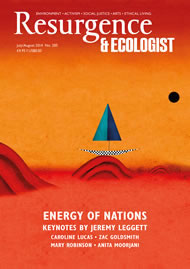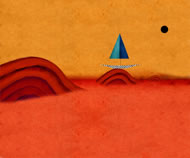Distraction. We live in an age of constant movement and famously short attention spans. Numerous cultural and technological forces drive us in that direction: globalisation; the communication revolution; a widely shared sense that it’s better to know a little about lots rather than a lot about little; impatience and reluctance to spend years mastering a skill; a sense of distance from the centering and calming force of Nature; a widespread wanderlust and distrust of the local and the parochial; alienation and angst. Of course, we are very fortunate to be open to broad horizons. Exposure to ‘big pictures’, if we view them holistically, can lead us towards wisdom. On the other hand, we lose something by always being generalists or dabblers.
We often overcomplicate our lives; we want what’s over the next hill, instead of counting our blessings and loving the present moment, for its own sake, for its ultimate reality. We look for complicated solutions and distrust simple, basic, bread-and-butter answers. We expect ‘progress’ and change to be the norm. We fail to appreciate everyday pleasures and the soothing satisfaction of simple tasks. We live in a culture that is often suspicious or dismissive of ancient wisdom. We don’t listen enough to our bodies or to our instincts. We look for quick fixes, which take us away from our true selves and our true purpose. We expect too much of life and also too little. We want to try everything once, but we don’t know what we’re really looking for.
Of course, we must always take responsibility for ourselves, and often these are personal choices. But we also lack a culture that can show us the way, whereas in other times and places ritual, music, dance, closeness to Nature and communal activities provide a guide.
Moreover, there are systems, structures and leaders that want us to stay that way: distracted and misled. They don’t want us to ask too many questions about the food we eat or the clothes we wear. They don’t want us to see into the sweatshops and the abattoirs. They don’t want us to look beyond the façade.
Leaders love to divide and rule. They don’t want us to see the universal oneness of humanity and creation. They like to pit us against each other and to encourage us to blame one another for our failures and problems. So we forget how to look clearly and honestly in the mirror and we rarely attune ourselves to the material, physical world around us, of which we are ourselves made. We rarely take time to look deeply and to see that all of creation vibrates with life and is eternally connecting and communicating in its own way. Choice, often held up as a great modern good, distracts us from that task.
Apprentices study for five or ten years: true skill and knowledge require decades of study and total immersion; a minimum of 10,000 hours is often mentioned. If you want to become a good potter or violinist or singer or scientist, you must stick with it and not give up, or chop and change, always wanting to try something else.
So many of us are inclined to do just that. We allow ourselves to be distracted; in fact, we deliberately seek distraction to fill an empty hour, instead of concentrating on what is truly important and worthwhile to us. So what is the solution to all of this distraction?
We need to learn to balance ‘being’ and ‘doing’. We want to create days and lives that are worth living. We want to use our abilities to help to make the world a better place. We also need the wisdom that comes from ‘being’ and from sensing, attuning, communicating and focusing.
Clearly, also, we must learn the art of concentration in order to enrich both being and doing. But concentration on what? Whatever is most real, most truly rewarding, healthy or beneficial. Relationships, creativity, altruism, concern for others and for the future, making the world more beautiful, discovering and revealing the true nature of things, finding and communicating glimmers of wisdom, revealing true values. That has always been the role of Resurgence, and now the Ecologist. Those things are everywhere, in all of us, but often hidden, ignored by the busy world, by the media, obsessed with celebrity, sport and 24-hour news cycles, by the world of power. The role of Resurgence is to reveal those realities, to bring them into the light, to help them to resurge, to return, to find their proper place at the centre of life, to give them strength to push back the forces of distraction. I hope that Resurgence & Ecologist will be able to do that for many, many years to come.
This is an edited version of a speech delivered at the January/February magazine launch and networking party in London.








